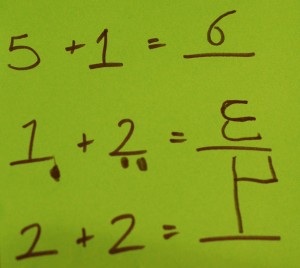
Photo by Amanda Westmont
Education leaders in California are turning their sights to making sure students have a strong foundation in mathematics when they enter kindergarten. And that means introducing students to math in preschool.
Preschool math was the focus of a meeting of leading educators and researchers from around the state at Stanford University last week. Participants included Michael Kirst, the president of the California State Board of Education, Catherine Atkin, president of Preschool California, and Kris Perry, executive director of First 5 California.
The meeting was led by Deborah Stipek, former dean of the Stanford University School of Education, and Alan Schoenfeld, a professor of education at UC Berkeley.
Historically, there has been little coordination or discussion among the numerous California organizations, educators and researchers involved with early childhood education about how to develop strategies for incorporating math into the preschool experience. Last week’s convening was intended to start that conversation.
Stipek told EdSource that while reading and writing skills have gotten a good deal of attention in preschool, math has not gotten the attention it deserves.
In fact, research led by Greg Duncan, currently at UC Irvine found that mastery of math concepts in preschool are “the most powerful predictors of later learning.”
A 2009 National Research Council report called lack of high-quality preschool math instruction a major problem, particularly for disadvantaged children who will begin school already behind.
The report underscored the capacity of preschoolers to master early math skills. “In fact, well before first grade, children can learn the ideas and skills that support later, more complex mathematics understanding,” the report noted, with basic understandings of number, geometry, and measurement being especially important.
Those concepts are often absent from or underdeveloped in the preschool curriculum. “Math for the most part is not done very much in preschools,” Stipek said. “When you look at what is typically done, it’s things like calendar and counting.”
One goal of last week’s meeting was to share draft findings and recommendations from an earlier meeting at UC Berkeley last fall. That event convened national experts to discuss existing research on early math, what makes for quality instruction, the preparation and support early educators need, and policy actions that states and the federal government should consider. The Stanford meeting last week was designed to initiate a conversation about these issues in California.
According to the conveners, a compelling reason to take on these issues now is that new state assessments aligned with the Common Core State Standards are likely to make new demands on California students. That will mean students will need a stronger grounding in math concepts early on.
California’s current math tests are multiple-choice. But the tests being developed by the SMARTER Balanced Assessment Consortium, assuming they are implemented as envisioned, will include items that require students to explain their reasoning and performance tasks that require students to plan a response to a real-world scenario.
A major challenge for California in introducing students to math fundamentals is that the quality and settings for early childhood education vary across the state. Caregivers and teachers have widely different educational backgrounds, and may have little background in math. And as Lynn Karoly and her fellow researchers described in a 2008 RAND Corporation report, early education settings range from public and private childcare programs and preschools, to care from a parent or from another adult in a home setting.
California has already taken some steps to promote preschool math.
The California Department of Education’s extensive Preschool Learning Foundations publications describe, among other things, what four-year-olds and five-year-olds should be able to do mathematically if provided a high-quality preschool experience.
In addition, the state has developed assessment tools, the Desired Results Developmental Profile, that can help educators at a pre-school level observe and document each child’s growing mastery of various early math skills.
(Note: EdSource’s Matt Rosin was an invitee to last week’s Stanford gathering.)
For more background, see the following resources:
Success Begins Early, an EdSource brief, July 2011.
Mathematics Learning in Early Childhood, by the National Research Council, 2009.
School Readiness and Later Achievement, in Developmental Psychology, by Greg Duncan et al., 2007.
Prepared to Learn, RAND Corporation, 2008.
To get more reports like this one, click here to sign up for EdSource’s no-cost daily email on latest developments in education.